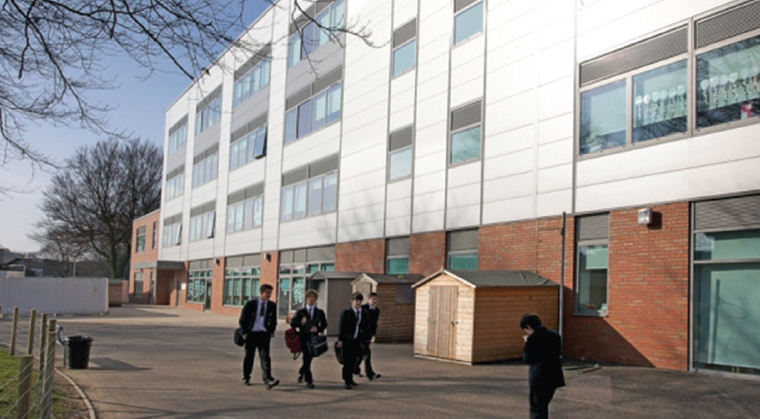Jewish Schools Targeted Again in Britain

UK Jewish schools take another blow

Photo: CC BY-SA 3.0 Josh Goldman
A
year after hostile government inspections of UK chareidi schools generated a storm, there are signs that things are getting worse, as a high-performing non-chareidi school came in recently for similar treatment.
Two weeks ago, Ofsted, a government agency that inspects schools across the UK, released a highly critical report of their March inspection of Manchester’s King David school. KD, as it’s known, is a major traditional Jewish school that has a Modern Orthodox stream called Yavneh constituting 30 percent of pupils. According to the school, Ofsted inspectors focused heavily on the fact that the Yavneh division is separated into boys and girls schools, which they claimed constitutes unlawful gender segregation. The King David episode makes clear that although the schools issue has gone below the radar recently, the threat to Jewish education in the UK is alive and well.
Ofsted’s own report into the inspection makes clear that the reason that the school was downgraded from outstanding in 2015 to inadequate — despite the fact that “pupils’ attainment is high” — was largely due to the separation of boys and girls. The inability of boys and girls to learn and socialize together, the report wrote, means that “they miss out on the educational and social benefits of doing so.”
Religious freedom in the UK is guaranteed by the Human Rights Act of 1998, and is limited only where it infringes on others’ rights. But in a letter to teachers, longtime King David chairman Joshua Rowe noted that religious freedom always seems to take a back seat in Ofsted’s assessments, adding that “some wonder whether this may be part of an agenda to diminish faith and religion and their associated denominational schools.”
The slow-burning crisis has its roots in a government drive to tackle extremism in Islamic schools. The Court of Appeal, which is second only to Britain’s Supreme Court, ruled in 2017 that separation of boys and girls at the Al Hijrah school in Birmingham was in breach of the Equality Act. Ofsted told the court that they would apply the same standards to Christian and Jewish schools, many of which receive government funding due to Britain’s lack of separation of church and state. The result is that Jewish schools have become collateral damage, as seen in the ongoing series of hostile inspections.
This latest episode is significant because of what it reveals about Ofsted’s agenda. If the King David school, which sends many graduates to leading universities, has been marked down, it signals that in Ofsted’s eyes high scholastic standards mean little when weighed against the sin of perceived gender discrimination.
According to Rabbi Avrohom Pinter, principal of Yesoday HaTorah girls school in London and member of the governing body of Chinuch UK, “this demonstrates how every Orthodox institution is potentially in the line of fire. Ofsted is a staunchly secular organization, and this shows how far they will go to find applications of the law that impose their worldview on religious communities.”
The latest blow to Jewish schooling in the UK shows that despite intense lobbying efforts — both on behalf of Jewish establishment and chareidi organizations — Ofsted continue to call the shots in their dealings with schools.
A Jewish community source said that the Department for Education, which is ultimately responsible for acting on Ofsted’s reports, has been quietly sympathetic to the position of Jewish schools. This pragmatic attitude means that noncompliant schools are not about to be closed down wholesale, and funding for schools’ expansion is still available. But this doesn’t hide the dramatic change faced by Britain’s Jewish schools. From being an unquestioned part of the national school system just a few years ago, they are now on the back foot; forced to adopt classic shtadlanus with one government department because of the hostility of another.
The hope expressed a year ago that Britain’s political echelon would act to rein in the inspectors hasn’t materialized. That’s partly because Brexit agonies have consumed all the political bandwith. But it’s also because in liberal Britain, the government’s position is fundamentally in step with Ofsted, as Education Minister Damian Hinds made clear last week. Speaking in Parliament, he laid out several policy goals that match up very neatly with the objectives of the Ofsted inspections.
Going forward, King David chairman Joshua Rowe says that only a successful court challenge to Ofsted can avert the need to break up the school into three separate academies.
Whatever the solution, the King David inspection is a wake-up call. It’s now clear that for Jewish schools across the spectrum, Ofsted’s illiberal liberalism is a threat that won’t go away.
What's Up
45.9°C
Last week France recorded its highest temperatures in almost five hundred years, bringing back memories of my own encounter with extreme heat in the country. With temperatures soaring across Europe, a punishing 114° Fahrenheit was recorded at a weather station in Gallargues-le-Montueux, near Nimes, in southern France.
Inevitably the temperature quickly became a climate-change football, with some experts linking it to a fall in the speed of the Gulf Stream, or a result of melting polar ice. But news of the scorching heat brought back memories of the last summer vacation I spent in France back in 2003. Leaving from Gateshead Yeshivah to join my family via the Channel Tunnel rail link, I arrived in the country in the middle of a deadly heat wave. My schoolboy French was (back then) good enough to read the newspaper headlines over a fellow passenger’s shoulder.
The news was full of what had become a national scandal, as 14,000 people died over a ten-day period, part of a Europe-wide death toll of more than 70,000. Then French president Jacques Chirac blamed the deaths on families who had abandoned elderly relatives while they vacationed, and a holiday-induced doctor shortage. Also to blame was Europe’s dearth of air conditioning. Even today, less than 5% of French and 2% of German homes have air conditioning systems, as compared to more than 87% in the US.
But this time, French authorities are determined to avoid a repeat, with authorities opening venues such as air-conditioned sports halls to the public. A 400% spike in demand for cooling systems was recorded before the heat wave hit.
What's Down
Sultan Erdogan
With a thousand-room palace, a job for life, and a political style that mixes Islamism with power plays abroad, Recep Tayyip Erdogan has become known as Turkey’s new sultan. But after his AK party lost the Istanbul mayoral election on June 24 — its first loss since 2002 — Erdogan isn’t looking as high and mighty.
Ekrem Imamoglu of the nationalist CHP actually won the election back in May by a narrow margin, but the results were annulled after Erdogan claimed electoral irregularities. The fact that the second victory last week was by a decisive margin — 54% — shows that something has changed.
As Turkey’s capital and largest city at 16 million, Istanbul is seen as a harbinger of political fortunes in that country. Erdogan’s own career in national politics began with a successful tenure at city hall. So Erdogan is worried that Imamoglu could challenge AK’s long dominance of Turkish politics.
A more secular Turkish leader would be welcomed by Israel, which has had to bear Erdogan’s vitriol over Gaza. But it would also be welcomed by the US. Erdogan has pushed ahead with the purchase of the Russian S-400 air defense system, which would potentially endanger the advanced F-35 fighter jets they’re also absorbing from the US. Weakened though he may be, Erdogan isn’t going anywhere just yet.
(Originally featured in Mishpacha, Issue 767)
Oops! We could not locate your form.













